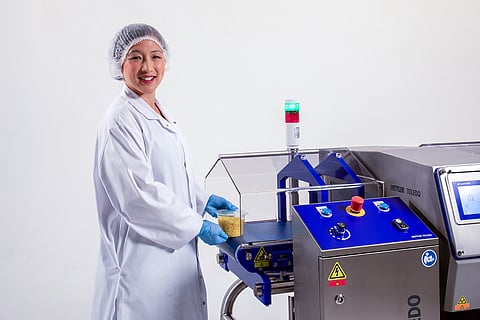
- Home
- EventsEvents
- Product Launches
- CategoriesCategories
- Advertise
- Opinion

Keeping Food Safe
Food safety is a top priority in the food industry, and with increasing consumer demands for safe and high-quality products, manufacturers must implement robust measures to help ensure the integrity of their food offerings. This article explores the vital role of product inspection technologies in keeping food safe. By automating the detection and rejection of foreign body contaminants, ensuring precise weight, and protecting businesses through real-time monitoring of all inspection activities, these cutting-edge technologies are helping to revolutionize food safety practices.
Detecting Metal
The presence of foreign bodies in food can lead to serious health risks and costly product recalls. To combat this issue, manufacturers can employ advanced metal detection systems. These systems utilize electromagnetic fields to detect and reject metallic contaminants in various food products, in a pipeline, under free-fall conditions, or on a conveyor. From dry goods like chocolates to wet foods like dairy products, metal detection systems can be seamlessly integrated into production, acting as a critical control point for foreign body detection.
Rejecting Foreign Bodies
Metal detection systems excel at detecting metallic contaminants, but what about other foreign bodies, for example, calcified bone, dense plastics, and glass? This is where X-ray inspection technology comes into play. X-ray systems offer a versatile solution for detecting foreign body contaminants, including glass, stones, plastic, and bone fragments. With the ability to identify foreign bodies at critical control points in the production line, x-ray inspection provides high food safety. X-ray technology is safe for food products and does not emit harmful radiation.
Additional Quality Checks
X-ray inspection technology not only detects a wide range of contaminants but it carries out comprehensive quality checks that contribute to overall food safety. By utilizing X-ray inspection, manufacturers can verify product integrity, ensure proper filling, detect missing or broken products, and confirm the presence of inserts or seals. These additional checks provide an extra layer of assurance to deliver safe and high-quality food products to consumers.
Precise Weight
Precision weighing is of utmost importance regarding food safety, especially for vulnerable consumers like babies who rely on specific portions of milk, food, or powder. Integrated into the production line, checkweighers play a vital role in verifying the weight of individual products. Checkweighers can help mitigate the potential risks associated with incorrect portion sizes by precisely measuring and rejecting under and over-weight items. Including innovative load cell technologies such as FlashCell enhances checkweigher performance by offering rapid and accurate weighing capabilities, even in high-speed production environments.
Additionally, design advancements specifically for harsh washdown environments help product inspection systems withstand rigorous cleaning procedures, eliminating any potential sources of contamination. This combination of advanced features helps to complete contaminant detection and precise weight control checks, even in challenging production settings, bolstering food safety efforts.
Protecting Your Business
Food safety is not only essential for consumer well-being but also crucial for protecting a manufacturer’s business. All product inspection systems complete real-time monitoring of all inspection activities and capture the data. For additional traceability, innovative software solutions like ProdX help manufacturers to digitally capture and combine all inspection data, track products throughout the supply chain, and provide comprehensive traceability in case of any incidents. The software can assist a manufacturer in demonstrating due diligence through regulatory compliance and help facilitate product safety audits and recalls.
Boosting Productivity
Implementing product inspection technologies not only leads to food safety but also helps to boost productivity. Automation of essential processes reduces human error, enhances production efficiency, and minimizes the risk of recalls. Manufacturers can meet consumer demands effectively by streamlining operations and maximizing uptime while maintaining the highest food safety standards. One example of streamlining operations plus saving space at critical control points is integrating a combination inspection system into the production line. Based on a manufacturer’s quality assurance requirements, companies can benefit from a system combining metal detection or x-ray inspection with checkweighing. Manufacturers can save factory floor space, time, and money by having one training to use the system, a smaller machine footprint, reduced spare parts, and one service provider to support the machine.
Conclusion
Product inspection technologies are indispensable tools for keeping food safe and protecting both consumers and businesses. By detecting and rejecting foreign body contaminants, ensuring precise weight, and leveraging digital solutions for real-time monitoring and traceability, manufacturers can enhance food safety practices, comply with regulations, and deliver products of the highest quality. Embracing cutting-edge technology is the key to protecting the food supply chain and building consumer trust in an increasingly demanding market.
Author - Ian Robertshaw, Global Key Account Manager, Mettler-Toledo Product Inspection
Click HERE to subscribe to our FREE Weekly Newsletter
